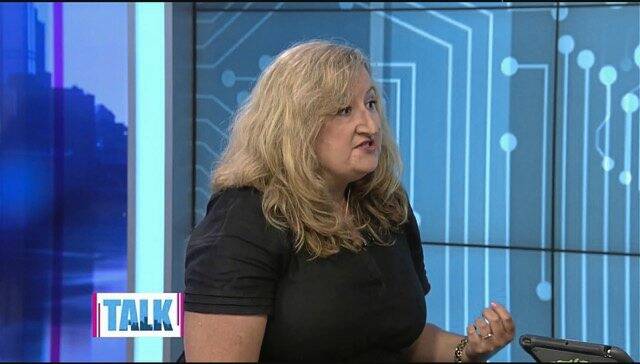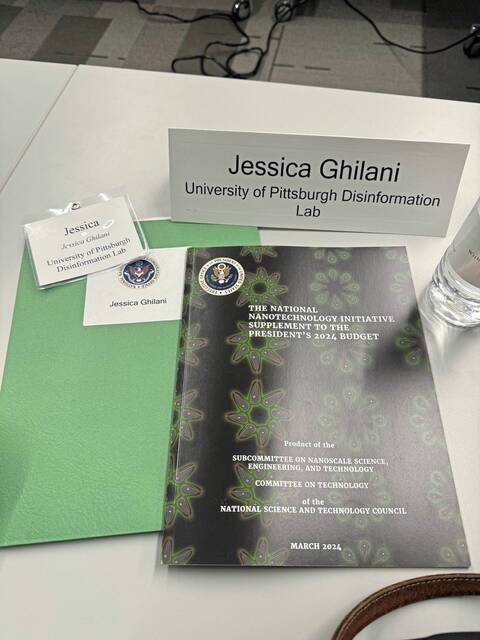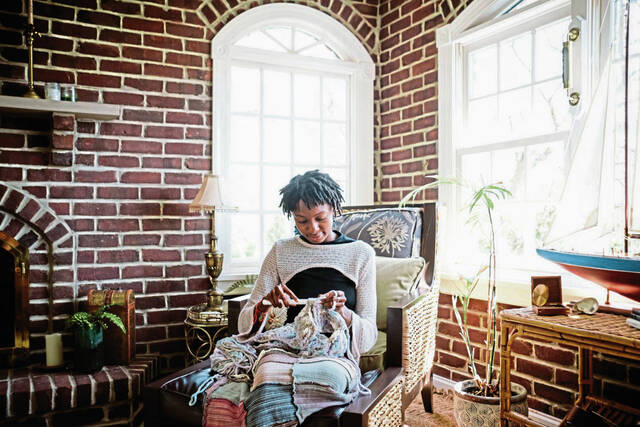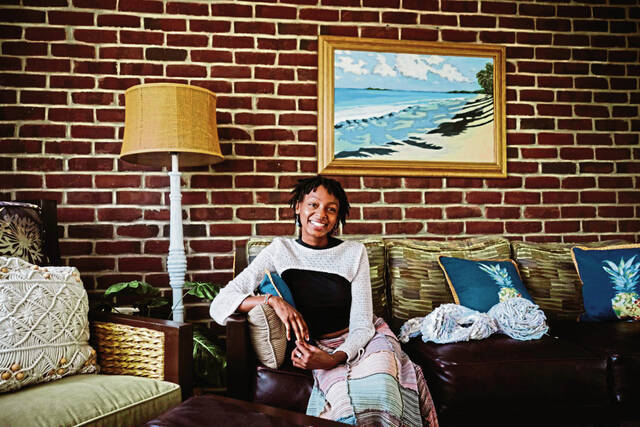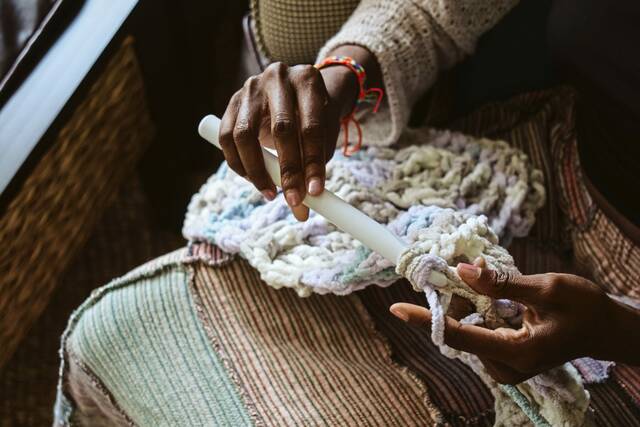Rosemarie Powers, 21, of Irwin joined social media at 7 years old when her mother first let her open up a Facebook account. Her formative years were marred by the influence of social media — platforms parents and experts weren’t prepared for.
“Parents were blindsided,” said Sophia Choukas-Bradley, licensed clinical psychologist and associate professor of psychology at the University of Pittsburgh. “Social media moved faster than science, and families were left unprepared.”
Social media has shifted from a space for casual connection to a high-stakes arena shaping childhoods, careers and family life. As Gen Z and Gen Alpha grapple with the pressures of growing up online, older generations are also confronting how these platforms have rewired the way people connect, work and define themselves.
Social media apps were designed to maximize user engagement, which encouraged programmers to create products that were behaviorally addictive, according to Choukas-Bradley. She believes parents were left in the dark.
“Many, with the best intentions, helped their kids join platforms long before we understood the potential impact on mental health,” Choukas-Bradley said. “Today we know much more, but we’re still playing catch-up.”
A relationship strained by social media
As her mother’s only child, Powers was often posted online. As Powers got older, she asked her mom to stop posting.
“It was damaging to our relationship,” Powers said. “She would post kind of embarrassing things of me.”
She vividly remembers one incident when she and her mom went to a K-pop concert and her mom posted a video of Powers singing along. Peers at school found the video and bullied Powers.
“I felt like no one was supposed to see that,” she said. “I did that because I was in a space where people liked the same thing as me. When it got out there, I felt so embarrassed.”
Powers felt as she got older and started to suffer mentally, and wasn’t doing as many “postable” things, the social media buzz decreased.
“I wasn’t posted as much,” she said.
Powers has already decided that if she has kids, she won’t post about them on social media. She wants them to have as small a digital footprint as possible. But she understands where her mom was coming from at the time.
“The peak of me being posted was probably the loneliest time in my mother’s life,” Powers said.
Her parents divorced when she was 7 — the same year Powers opened her Facebook account. Social media posts helped her mom feel like she had a sense of community, Powers said.
“She was excited to share me,” she said.
Jessica Ghilani, associate professor of communications at the University of Pittsburgh’s Greensburg campus, believes the pendulum is swinging from chronically oversharing to cleaning up digital footprints.
“Many parents my age have kids asking them to archive their photos,” she said. “These are Gen Alpha. They’re afraid their friends will find the account and make fun of them. Taking charge of your digital footprint can feel empowering for young people.”
Exposure to traumatizing content
From a young age, Powers remembers feeling like she was digitally sucked into spaces that were far “too grown.”
“One thing about being on the internet so young was the crazy (stuff) you’re exposed to so early on,” she said. “I didn’t realize it until I became an adult, but I was in circles that were too grown for where I was. You’re exposed to many scary people. Especially back in the day, without parental controls.”
Choukas-Bradley said while teens today are less sexually active offline, they’re exposed to an explicit online world.
“They’re navigating sexualized content, grooming risks and unprecedented pressures to self-sexualize in ways we’ve never seen before,” the professor said.
She blames platforms that reward sexualized content because it “performs well,” blurring the line between empowerment and exploitation.
“I’d be in a different place mentally if someone had restricted (my social media use),” Powers said. “I think I wouldn’t have had to go back and fix my dopamine levels and have had less obsession with my appearance.”
Powers found herself in online groups, exacerbating the insecurities and doubts she was feeling offline. One of the very few Black students at Franklin Regional High School, Powers already felt strange and “othered.” Social media made it worse.
“For (girls of color) growing up in predominantly white areas, social media can magnify feelings of otherness,” Choukas-Bradley said. “So while these platforms can be powerful for connection and representation, they also bring unique challenges that compound the broader body image pressures we see in all girls.”
Some influencers spread content asking followers to send in body checks or pictures of themselves, and then encourage the young girls not to eat.
“The fact that I was on there unrestricted,” Powers said. “I thought it was cool to be on social media without anyone telling me what to do, and now I wish somebody had taken my phone.”
Choukas-Bradley believes social media has fundamentally changed the way girls experience adolescence.
“It turbocharges old pressures to look perfect, adds quantifiable measures of popularity and ensures there’s no real escape,” she said.
She labels the phenomenon “appearance-related social media consciousness,” which is a never-ending awareness of how one might look to their online audience, even when offline. Her research demonstrates that this self-consciousness leads to more body dissatisfaction, self-objectification and risk for depression and disordered eating.
Setting up social media boundaries
Many Gen Z social media users are either opting out completely or establishing much more stringent boundaries than their millennial and Gen X counterparts.
Erin McCullough, digital content manager at Atlas Marketing, has been in the social media world since Facebook and Google took the stage. She entered the field as part of a brand management company that helped clients publish new content to bury content they were embarrassed of, such as college partying posts or even parking tickets. She’s noticed there’s less of a market now for covering up social media embarrassments, as young people tend to be more strategic. They opt for disappearing images on Snapchat or Instagram stories, or they post on TikTok or other platforms where future employers are less likely to check.
“I’m thinking even younger than Gen Z, and they’re not posting everything online,” McCullough said. “They’re not dumping 50 pictures from the night out before on Facebook.”
Arabella Gilanshah, 22, of Mt. Lebanon used to be very active on social media, but has decided to be more private online.
“There was a season where I loved it and posted everything I did,” she said. “But as I got older and things got more special to me, I had a desire to protect it.”
Recently married, she has posted very minimally about both the engagement and the ceremony.
“To millennials, social media was new,” she said. “As we’ve gotten to experience social media more, we realized it’s a double-edged sword. There’s something vulnerable and raw about putting something so special to you on social media for people to pick apart.”
Powers deleted her Instagram, TikTok and Snapchat accounts. The pressure of comparison and presenting herself online was too much to bear, and she decided to take a break.
“I don’t post myself anywhere anymore,” she said. “At first, I felt like I was going crazy — I was addicted to my phone.”
Eliminating her social media freed up time for crocheting and working out. Powers feels it’s easier to do important things and pay attention to her life goals now.
When she first deleted social media, she felt something new — boredom, something she said she hadn’t felt in years. She picked up crochet hooks and got to work.
She now enjoys spending weeks or months on her crochet projects. At the end of all her effort, she has a final project she can be proud of.
“It feels rewarding,” Powers said. “I can see my progress. Hours of work amount to something. I’m not just scrolling anymore.”
The professionalization of social media
In today’s elementary schools, the dream job is YouTube influencer.
On college campuses, Instagram feeds and TikTok pages act like social résumés. Young professionals curate their LinkedIn profiles, documenting career shifts and life milestones. And older members of Generation X and Baby Boomers are finally putting their family businesses online.
The platforms may differ, but one truth remains: Social media means business and every generation is adapting to the stakes.
“No platform is immune to users trying to build a following through a personal brand,” McCullough said.
She sees users posting everything from job-hunting updates to reflections on parenthood on LinkedIn.
“That’s where I’ve seen the biggest growth and engagement,” she said. “I even know of companies that do direct sales over LinkedIn. It blew my mind. Who wants to do business over DM? But it’s a thing.”
At Atlas Marketing, McCullough helps companies embrace online branding — even when their owners are still filing sales by pen and paper.
“Some don’t even have profiles online,” she said. “It’s my job to convince them why any of this is relevant.”
As a marketer, she praises Facebook’s advertising power. As a person, she dislikes how much data is shared. “That’s a reason people are leaving the platform,” she said.
Ghilani sees a generational shift toward privacy.
“Everyday people who aren’t trying to become TikTokers want more control over what’s out there about them,” she said. “Maybe they’ll post a story — because that disappears — but they’re more careful. If it’s not fueling their brand, they don’t post.”



